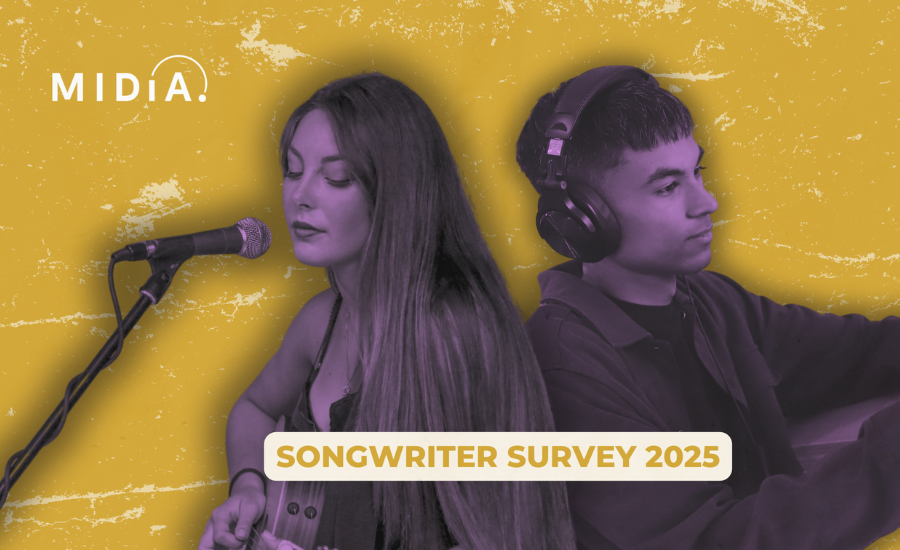With a deep understanding of business and the culture of entertainment, MIDiA Research brings clarity to complex industries with trusted data and powerful insights. Their multi-country consumer data, forecasts and market shares makes MIDiA an authority figure in data, the creator economy, and cross entertainment.
MIDiA Research has just launched its second annual songwriter report, we had a little sneak preview and wanted to highlight some key findings. If you want to jump straight to the report just click here, but for now, let’s take a closer look at some of the headlines.
The Changing Role of Songwriters
Songwriters are a crucial backbone to the music industry, however the evolution of the industry in the digital age has meant that they have become some of the most affected roles.
Traditionally when we still had physical records, songwriters were compensated equally for their work on an album (no matter how many times you pressed rewind on your favorite song). There was no other option because the album was the only product.
With the digital revolution of music and the emergence of streaming platforms, songwriters felt the change – not only were they now compensated by each individual song, but by number of plays, and too often this compensation is divided with several other creators.
And because the laws always struggle to keep up with digital innovation it’s important to keep in mind that regionally this can mean that it’s fixed. Take the US for example, mechanical royalties are set by a statute, meaning that there is no wiggle room for negotiation.
New Strategies and Revenue Models
With no touring, merchandise or other fall back revenue options for songwriters, MIDiA saw something else happening, a trend in the new generation of songwriters, adopting several titles, wearing different hats, straying from the traditional “pure” songwriter title.
The biggest place songwriters have turned to? Social media. As with so many industries, there’s a lot of pressure around professionals using social media to get more exposure for their work, and songwriters have seen this opportunity, especially considering they may also be performers or producers.
A more innovative revenue model that has seen an influx of users are work-for-hire platforms such as Fiverr and SoundBetter which allow users to take control over the services they provide, and negotiate their fees without an intermediary.
Key Insights from MIDiA’s Report
This is MIDiA’s second annual report on songwriters, conducted worldwide, with over 700 global participants (up by 467 from 2024’s survey) and consists of interview formats as well as surveys of modern, diverse song writers from across the world.
MIDiA’s report highlights five main facts centered around the future direction of songwriters and how the industry is evolving to make it a more sustainable environment:
1. Branding:
Roughly 1 in 5 songwriters are prioritizing building a social media brand with Instagram the most popular platform for posting – reflecting more songwriters coming out from behind the curtain
2. Income & Revenue:
Most songwriters, even those who are members of a collection society, say they struggle with earning a strong income. However, 61% admit that they aren’t a member of any MRO (Mechanical Rights Organization).
3. Creator Marketplaces:
The rise in creator marketplaces (such as Fiverr) has opened up a new revenue stream for songwriters, increasing their income than the average songwriter, but the report also found that songwriters who use creator marketplace are also releasing more music as a whole.
4. Social Media:
While songwriters expressed the need to be more active on social media, the study found that most of them hold a negative view of social media posting. However, one-third of songwriters believe that posting on social media is important. This positivity is echoed in another finding: songwriters who post more consistently tend to have more releases compared to those who do not post regularly.
5. Success:
With the evolution of songwriters and what the title means, the definition of success has also changed; while historically songwriters would define success by the number of awards and hits that they had under their belt, today it looks more like achieving creative fulfillment and earning a living.
“Similar to the trend MIDiA’s bifurcation theory has identified among artists, today’s songwriters have moved on from realising that the current business model does not work from them – and begun the work of building their own. The songwriters we surveyed and interviewed reflect a wide range of new business structures, many existing outside of traditional rights frameworks, with creator marketplaces and social platforms playing a growing role.”
Tatiana Cirisano, VP of Music Strategy at MIDiA Research
Rewriting the Rules
The key takeaways found that there were common themes throughout the findings: Songwriters need more support and recognition in order for songwriting to remain a sustainable profession. There’s value in songwriting, but the industry needs to recognise and act on that and the traditional model needs to change.
Two key areas of improvement are:
- Education around royalties and how they work
- Addressing and building on current practices (i.e. non-writing contributors receiving publishing shares)
With the evolution of what success looks like for a songwriter, the industry is reshaping itself to be more open to new opportunities, and songwriters are at the forefront of molding this to reflect the strengths and priorities.
This looks like
- negotiating upfront fees
- building more non-royalty based revenue streams
At its core the digital era has meant significant changes for audiences, platforms and creators, so why should songwriters change too?
If you’re interested in diving deeper into the insights and data shaping the future of songwriting, we highly recommend reading MIDiA Research’s Second Annual Songwriter Report. It’s a must-read for anyone invested in the music industry, from songwriters and producers to publishers and labels.
Download the full report and explore the findings for yourself.
